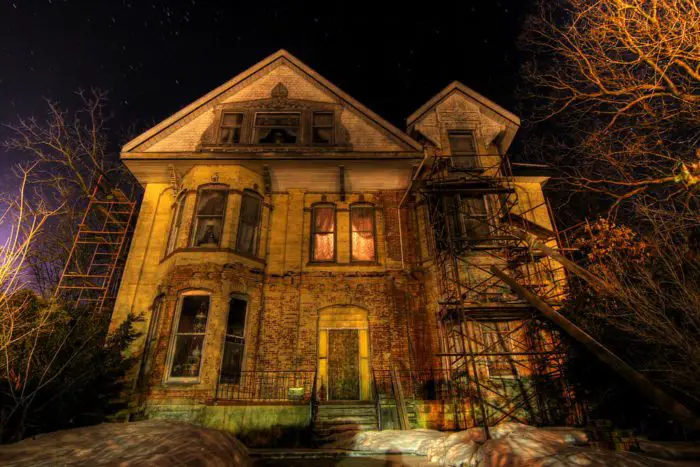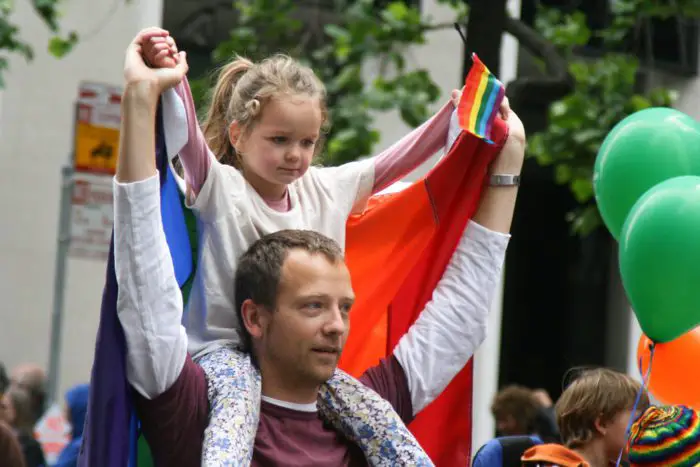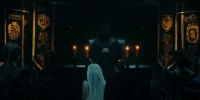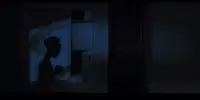Bram Stoker Award winner Norman Prentiss’ Haunted Attractions With Your Other Father is a sequel to Odd Adventures With Your Other Father. I didn’t read the first book. However, I decided to give it a chance anyway since it sounded like something that I would like. I wasn’t wrong.
The story sounds like a quirky paranormal adventure story, and it is. However, Haunted Attractions With Your Other Father is much more. It is a fun supernatural horror tale. The story is also an exploration of love, loss, the meaning of family, and making a connection with another person.
Shawn sees his daughter, Celia, off to summer camp. For the first time, she’s going as a counselor instead of a camper. After camp, she starts college. Shawn is also dealing with the loss of his partner, Jack, who died 14 years ago. Jack was the love of Shawn’s life, and together, they adopted Celia. She was only four years old when Jack died. Jack and Shawn had a unique connection through their paranormal abilities. Jack has telepathic abilities, and Shawn is a psychic medium. In between dealing with the present, Shawn tells Celia about his adventures with Jack on a road trip during the ’80s. Jack took Shawn cross-country with him to explore oddities and roadside attractions. Shawn tells Celia these stories, which she writes down.

Shawn keeps in contact with Jack after his death. However, he can only accomplish this by visiting Jack’s parents’, Charlotte and Edward Pruett’s, home. There was some conflict between Jack and the Pruetts around the time Jack died. Celia brough Shawn and the Pruett’s back together. Celia’s summer camp was near the Pruett’s home, and she tracked them down when she was 10 years old. She creates opportunities for Shawn to stay in the Pruett’s home so he can talk to Jack.
When the Pruetts decide to move on and out of their home, Shawn fears Jack’s spirit may fade away. He can’t face losing Jack again.
The three main characters, Shawn, Jack, and Celia, form a happy and supportive family unit. Celia wants to see her fathers together. She has a strong bond with both of them—even though she was very young when Jack died. Celia shows she wants to know more about Jack by tracking down his parents. She wants Shawn to commune with Jack. Celia listens eagerly and writes down the adventures Shawn tells her about.

Although they treat her like a stereotype, both the Pruetts accept Celia as their granddaughter. Since she’ll be close by at camp, they fix up a room for her in their house. Shawn stays in the room, which he describes as pink, frilly, girly—and not at all Celia. Shawn really has to bite his tongue during dinner one night when they decide to order Chinese food. Since Celia is Asian, the Pruetts assume that she would love Chinese food and that she could teach them to use chopsticks. Celia is actually Korean by birth. She was raised in America and does not know how to use chopsticks. However, the Pruetts mean well, and Celia actually is not as offended as Shawn is.
There’s a sense of denial as to Jack and Shawn’s relationship. In their conversations with Shawn, neither Charlotte nor Edward ever acknowledged that Shawn and Jack were romantic partners. Charlotte even goes as far as to imply that Shawn, who has been grieving for Jack for years, wouldn’t know what it’s like to lose a spouse.
Prentiss puts Shawn’s stories about his adventures with Jack between chapters. Prentiss knows how to put a disturbing picture in the mind of the reader. He also knows how to add a comedic flourish to it. Each attraction they visit reveals something. Jack usually sends Shawn grotesque and gruesome and sometimes funny distortions of reality, including bloody teddy bears with their entrails hanging out and a demon child in drag. However, when they visit haunted attractions, Shawn notices something different. The visions are a full sensory experience rather than a two-dimensional picture.
Prentiss eases into the story, and it unravels at a good pace, setting up mysteries that create suspense. He introduces us to everyday people surrounded by extraordinary circumstances. Presntiss’s characterization is vivid: Jack is laid-back, eccentric, and creative. Shawn is a dot-every-i and cross-every-t intellectual and librarian. Celia is a mix of the two, an aspiring writer as she writes the tales related by Shawn and has Shawn’s deep appreciation of literature. Also, still being a teenager, she has that uncertainty about her as she’s trying to find herself.

Prentiss effortlessly draws the reader into each of Shawn’s visions, sent by Jack, which delivers a surreal and gruesome experience. On a haunted house ride, Shawn sees an apocalyptic scene of an amusement park littered with corpses. In the Theater of Magics, he is drawn into a gruesome and grisly Greek tragedy, Thyestes, in which the titular character unwittingly eats his own children, served by his brother Atreus.
Prentiss knows how to leave the reader with a real sense of horror by creating vivid scenes complete with dead bodies, the scent of burning meat, and a taste of mystery meat that Shawn tries to scrub out of his mouth.
Prentiss also explores many LGBTQ+ themes in the course of the story of the Maze House. Shawn wanders into an enchanted maze, where he encounters scenes illustrating homophobia at its absolute worst. He sees apparitions acting out the thoughts of a homophobic entity. Crowds of people cast disdainful looks, point fingers, etc. The scene ends with a vivid vision meant to induce self-loathing in Shawn.

One paranormal event illustrates differences in LGBTQ+ issues from the ‘80s to now, showing Shawn’s own prejudice towards people who are transgender. He takes the time to apologize and explain this to Celia as he’s telling the story. He and Jack take a trip to a place in Michigan claiming to be America’s Stonehenge. Rose, a transwoman, works in the museum, and Jack makes fun of her a bit behind her back—or so they think. Like Jack and Shawn, Rose has extrasensory abilities. Jack leaves the exhibit transformed into a woman. Shawn believes Rose did this as revenge, but Prentiss just throws the reader another surprise twist.
Prentiss effectively employs horror elements to explore larger issues. He explores loss, grief, and the meaning of family. Although part of Shawn and Celia’s lives, Jack’s biological family is estranged. Their denial and lack of acceptance are barriers to what could be a wonderful relationship. Jack and Shawn, fortunately, found each other. Their bond extends beyond just a sexual relationship. It even includes extrasensory abilities. Together, even after Jack’s death, the three are still, and always will be, family. Prentiss’ story isn’t a simple haunted house horror tale but a poignant tale illustrating love, loss, and family ties that extend beyond biological connections.
I should say that the book does end with a cliffhanger. Prentiss ends with a promise to deliver a sequel soon. Leaving this story with a cliffhanger felt like suddenly pulling the rug out from under me. However, this is how wonderful the story is—if you relate to the themes. I understand why Prentiss ended when he did and decided to write a sequel.

The story dives deep into the lives of two people in love and what their lives were like in a society that didn’t accept them. Prentiss takes time to explore these themes in-depth, and I don’t think there would be a way to tie everything up in a neat little package within 350 pages. So, I’ll forgive Prentiss for that.
If you love oddities and psychological horror with a bit of the paranormal and LGBTQ+ themes, I recommend Haunted Attractions With Your Other Father.
Haunted Attractions With Your Other Father is currently available from Cemetery Dance Publications.
Norman Prentiss is a two-time Bram Stoker Award-winner in 2009 for his short story, “In the Porches of My Ears,” which was published in Postscripts 18, and in 2010 for Superior Achievement in Long Fiction for Invisible Fences, published by Cemetery Dance. His other works include Life in a Haunted House, Odd Adventures with Your Other Father (A Kindle Scout Selection), The Book of Baby Names, The Fleshless Man, Four Legs in the Morning, The Halloween Children (written with Brian James Freeman), and The Narrator (written with Michael McBride). Prentiss’s fiction has also appeared in many publications and anthologies.



